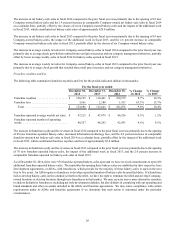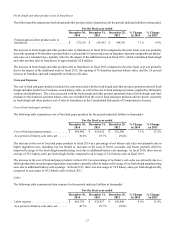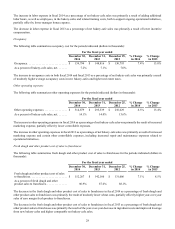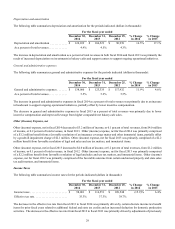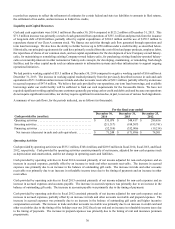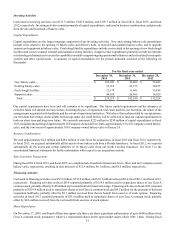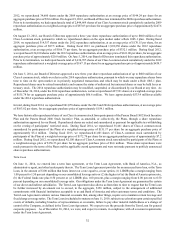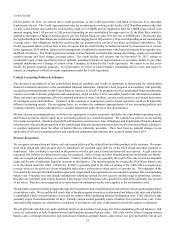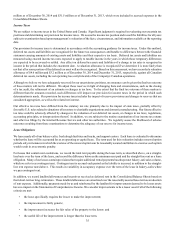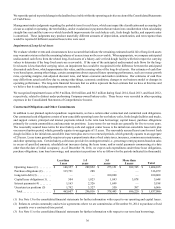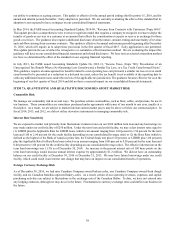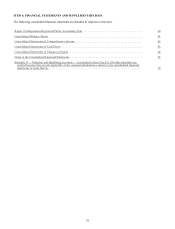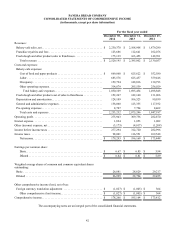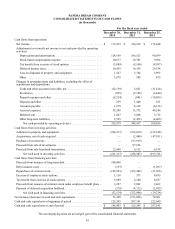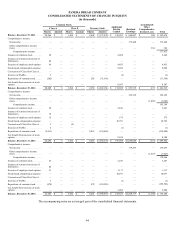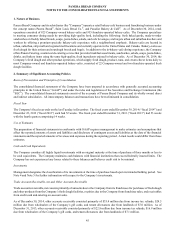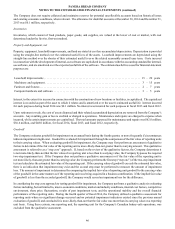Panera Bread 2014 Annual Report Download - page 48
Download and view the complete annual report
Please find page 48 of the 2014 Panera Bread annual report below. You can navigate through the pages in the report by either clicking on the pages listed below, or by using the keyword search tool below to find specific information within the annual report.
36
We report the period to period change in the landlord receivable within the operating activities section of the Consolidated Statements
of Cash Flows.
Management makes judgments regarding the probable term for each lease, which can impact the classification and accounting for
a lease as capital or operating, the rent holiday, and/or escalations in payments that are taken into consideration when calculating
straight-line rent and the term over which leasehold improvements for each bakery-cafe, fresh dough facility, and support center
is amortized. These judgments may produce materially different amounts of depreciation, amortization, and rent expense than
would be reported if different assumed lease terms were used.
Impairment of Long-Lived Assets
We evaluate whether events and circumstances have occurred that indicate the remaining estimated useful life of long-lived assets
may warrant revision or that the remaining balance of an asset may not be recoverable. When appropriate, we compare anticipated
undiscounted cash flows from the related long-lived assets of a bakery-cafe or fresh dough facility with their respective carrying
values to determine if the long-lived assets are recoverable. If the sum of the anticipated undiscounted cash flows for the long-
lived assets is less than their carrying value, an impairment loss would be recognized for the difference between the anticipated
discounted cash flows, which approximates fair value, and the carrying value of the long-lived assets. Our estimates of cash flow
were based upon, among other things, certain assumptions about expected future operating performance, such as revenue growth
rates, operating margins, risk-adjusted discount rates, and future economic and market conditions. Our estimates of cash flow
may differ from actual cash flow due to, among other things, economic conditions, changes to our business model or changes in
operating performance. The long-term financial forecasts that we utilize represent the best estimate that we have at this time and
we believe that its underlying assumptions are reasonable.
We recognized impairment losses of $0.9 million, $0.8 million, and $0.3 million during fiscal 2014, fiscal 2013, and fiscal 2012,
respectively, related to distinct under-performing Company-owned bakery-cafes. These losses were recorded in other operating
expenses in the Consolidated Statements of Comprehensive Income.
Contractual Obligations and Other Commitments
In addition to our planned capital expenditure requirements, we have certain other contractual and committed cash obligations.
Our contractual cash obligations consist of non-cancelable operating leases for our bakery-cafes, fresh dough facilities and trucks,
and support centers; principal and interest payments related to the term loan borrowings; capital leases; purchase obligations
primarily for certain commodities; and uncertain tax positions. Lease terms for our trucks are generally for five to seven years.
The reasonably assured lease terms for most bakery-cafe and support center leases is the initial non-cancelable lease term plus
one renewal option period, which generally equates to an aggregate of 15 years. The reasonably assured lease term for most fresh
dough facilities is the initial non-cancelable lease term plus one to two renewal periods, which generally equates to an aggregate
of 20 years. Lease terms generally require us to pay a proportionate share of real estate taxes, insurance, common area maintenance,
and other operating costs. Certain bakery-cafe leases provide for contingent rental (i.e., percentage rent) payments based on sales
in excess of specified amounts, scheduled rent increases during the lease terms, and/or rental payments commencing at a date
other than the date of initial occupancy. As of December 30, 2014, we expect cash expenditures under these lease obligations,
purchase obligations, term loan borrowings, and uncertain tax positions to be as follows for the periods indicated (in thousands):
Less than
1 year
1-3
years
3-5
years
More than
5 years Total
Operating leases (1) . . . . . . . . . $ 146,357 $ 289,852 $ 275,151 $ 692,745 $ 1,404,105
Purchase obligations (2) . . . . . . 315,791 288 — — 316,079
Long-term debt (3) . . . . . . . . . . — — 100,000 — 100,000
Capital lease obligations (1). . . 504 1,023 1,043 3,078 5,648
Interest payments (4) . . . . . . . . 1,163 2,326 1,699 — 5,188
Uncertain tax positions (5) 1,792 3,327 550 397 6,066
Total . . . . . . . . . . . . . . . . . . . . $ 465,607 $ 296,816 $ 378,443 $ 696,220 $ 1,837,086
(1) See Note 13 to the consolidated financial statements for further information with respect to our operating and capital leases.
(2) Relates to certain commodity and service agreements where we are committed as of December 30, 2014 to purchase a fixed
quantity over a contracted time period.
(3) See Note 11 to the consolidated financial statements for further information with respect to our term loan borrowings.


